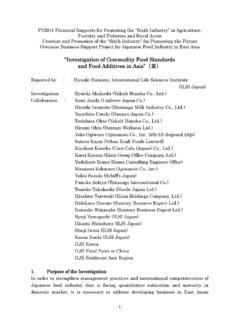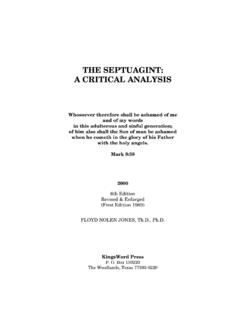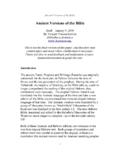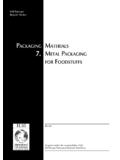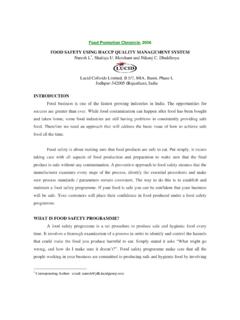Transcription of Why do Christians Worship on Sunday - exAdventist
1 Why Do Christians Worship on Sunday ? When you look at the history of our present day calendar, you will find that our days, our weeks, months and years have undergone many changes. We can t think that what is Sunday , February 20, 2011, is really a Sunday , the same 1st day of the week that has remained constant since the time of God s creation of the world! For example: In 1582 Gregory XIII found a miscalculation in the calendar and decreed to drop October 5-14 and to drop 3 leap years in every century. In England 11 days (September 3-13) were dropped in 1752, in addition to other changes. (See Heresies Exposed, p. 167). No, it did not come from paganism. Sunday was not a day of rest or Worship among pagans and neither was it a weekly holiday in the pagan world. In the early 20th century, D. M. Canright contacted highly qualified historians, including: Pryce, British Museum, Department of Greek & Roman Antiquities Exactly what day/date is the Sabbath?
2 Did christian Worship on Sunday come from Paganism? - 2 - R. Rathborn, Smithsonian Institute George F Moore, Harvard University, Prof. of Ancient Roman and Greek History Their responses can be summarized as follows: The pagan Greeks & Romans did not have a regular weekly day of rest, festival or Worship . There was no special day for people to go to the temples to pray or make offerings. For the Greeks & Romans, the month was the unit and not the week. The Romans divided the month into three periods of 10 days: Kaleend 1st Nones 5th or 7th Ides 13th or 15th These subdivisions had no religious significance. Every eight days the Romans had nundinal or market days these had no religious significance. The introduction of a 7-day week into the Roman calendar came from Egypt and was not earlier than the 2nd century AD. The planetary week in which the days were named from their regents ( Sunday , ) was an invention of the astrologers, sometime in the 2nd century and had no relation to religion.
3 The sun god was not worshipped on Sunday , the Moon god on Monday, etc. These names did not have religious significance only astrological. - 3 - The 7-day period of dividing the month appears in the Roman calendar after 391 AD and in Roman law in a constitution of Constantine (321 AD). This historical inaccuracy has been perpetuated by Seventh Day Baptists for over 300 years and by Seventh-day Adventists since the latter part of the 19th century. Often the question is asked, "Isn't it paying homage to the Roman Catholic Church to Worship on Sunday because didn't Constantine change the day of Worship ?" It is claimed that Constantine's edict of March 7, 321 changed the day of christian Worship from Saturday to Sunday . He didn t change the day Christians had always worshipped on the 1st day. He simply acknowledged and legalized the 1st day. A careful examination of historical early church documents reveals that from the time of the Resurrection of Jesus Christ, Christians were gathering for Worship on Sunday , the first day of the week.
4 Let s begin with the earliest historical evidence, the New Testament Record. From the Resurrection of Christ, Christians have always worshipped on the 1st day of the week and never on the Sabbath. Sunday is not a christian Sabbath or a day of rest, or a holy day to be kept. WHO CHANGED THE SABBATH FROM SATURDAY TO Sunday ? Was it the Emperor Constantine in 325 Was it the Roman Catholic Church? Constantine's edict reads: "On the venerable Day of The Sun [venerablili dei Solis] let the magistrates and people resid-ing in cities rest, and let all workshops be closed. In the country, however, persons engaged in agriculture may freely and lawfully continue their pursuits Codex Justinianus, book 3, title 12,3, trans. in Schaff, History of the christian Church 5th ed. (New York: Charles Scribner, 1902), vol. 3, p. 380, note 1. - 4 - It is the day Christians gathered together to Worship and eat the Lord s Supper.
5 (Acts 20:7) These appearances show that Jesus purpose-fully chose the first day of the week to meet with His disciples to encourage and exhort them. n The evidence shows that five of these appearances occurred on the 1st day of the week. We do not have a record of what the actual day on which the other appear-ances occurred to His disciples (John 21 and Acts 1:6-10). What we can say with accuracy is this, after Jesus' resurrection whenever He met with His disciples and the day is identi-fied, it is NOT the Sabbath, it is the first day of the week! Mary, on the morning of the resurrection - Matthew 28:8-10; Mark 16:9; John 20:11-18 Two disciples going to Emmaus - Luke 24:13-33; Mark 16:12-13 Simon (Peter) - Luke 24:31-35. The eleven disciples on the evening of Resurrection Sunday - Mark 16:14-18; Luke 24:36-44; John 20:19-23 1). THE 7 POST-RESURRECTION APPEARANCES OF CHRIST.
6 - 5 - The eleven disciples on Sunday , "eight days" later John 20:26-29 Pentecost always occurred on the first day of the week! This doesn't make Sunday the Sabbath, but it tells us that after the resurrection of Jesus, the Sabbath is not emphasized. occurred in the life of the first followers of Christ on the first day of the week. Jesus startled them by appearing to them on the first day (John 20:19). Jesus received Worship from Thomas on the first day of the week (John 20:27-28). Sunday evening Jesus took bread and blessed it and broke it and gave it to His disciples evidently like He had in instituting the communion meal (Luke 22:19) and their "eyes were opened and they recognized Him" (Luke 24:31). Sunday evening Jesus blessed His disciples twice saying "Peace be with you" (John 20:20; 26). 2). THE NEW TESTAMENT CHURCH WAS BORN ON A Sunday . 3).
7 Whenever a day of the week is mentioned in connection with the appearances of the risen Lord Jesus, IT IS ALWAYS THE FIRST DAY OF THE WEEK. - 6 - That same Sunday evening Jesus "..breathed on them and said 'receive the Holy Spirit'" John 20:22. On Sunday evening Jesus gave His disciples the ecclesiastical authority to proclaim forgiveness to those who believe in Him through the Gospel (John 20:23). Why did the Disciples meet on Sunday ? Because it now carried a special symbolic/anti-typical significance for them. Jesus chose to reveal Himself to them only on Sunday , when we know what day it is. That must also hold some kind of Divine significance. Jesus could have chosen to meet with His disciple on the Sabbath. This would have clearly set a New Covenant precedent. He did not chose to do this. The Sabbath was the sign of a fulfilled covenant (see Exodus 31:17 & Hebrews 8:13).
8 THE COUNCIL OF ACTS 15 CONVENED to determine what Gentile Christians must observe. SABBATH KEEPING WAS CONSPICUOUSLY ABSENT. Peter exhorted the leadership of the Church not to place the Gentiles under the Law: 4). THE FIRST CHURCH COUNCIL DID NOT INCLUDE THE SABBATH as an essential doctrine or practice for the church. - 7 - Acts 15:10-11 Now therefore why do you put God to the test by placing upon the neck of the disciples a yoke which neither our fathers nor we have been able to bear? But we believe that we are saved through the grace of the Lord Jesus, in the same way as they also are." The final judgment of the Jerusalem Council contained no reference to Sabbath keeping. In contrast, circumcision was discussed and deemed unnecessary (vss. 5-6; 19-20). Sabbath keeping was not even discussed because it is not a requirement for New Covenant believers: Acts 15:28-29 "For it seemed good to the Holy Spirit and to us to lay upon you no greater burden than these essentials; that you abstain from things sacrificed to idols and from blood and from things strangled and from fornication; if you keep yourselves free from such things, you will do well.
9 Farewell." NOTICE that the Holy Spirit told them NOT to lay upon the Gentiles any greater burden than THOSE ESSENTIALS. OBVIOUSLY THE HOLY SPIRIT DID NOT THINK SABBATH If Sabbath keeping were to be an essential part of the New Covenant relationship with God it would have been mentioned in the discussion because it would have been an unfamiliar practice to the Gentiles. - 8 - KEEPING WAS AN ESSENTIAL THING ANYMORE. In Mark 7:21-22, 13 sins are listed. Jesus did not mention breaking the Sabbath. "21 For from within, out of the heart of men, proceed the evil thoughts, fornications, thefts, murders, adulteries, 22 deeds of coveting and wickedness, as well as deceit, sensuality, envy, slander, pride and foolishness. NASU In Romans 1:29-32, 20 sins are listed but not Sabbath breaking. 29 being filled with all unrighteousness, wickedness, greed, evil; full of envy, murder, strife, deceit, malice; they are gossips, 30 slanderers, haters of God, insolent, arrogant, boastful, inventors of evil, disobedient to parents, 31 without understanding, untrustworthy, unloving, unmerciful; 32 and although they know the ordinance of God, that those who practice such things are worthy of death, they not only do the same, but also give hearty approval to those who practice them.
10 NASU In Galatians 5:19-21, a list of 15 sins are given. 19 Now the deeds of the flesh are evident, which are: immorality, impurity, sensuality, 20 idolatry, sorcery, enmities, strife, jealousy, outbursts of anger, disputes, 5). WHEN THE NEW TESTAMENT LISTS SINS, SABBATH BREAKING IS CONSPICUOUSLY ABSENT. - 9 - dissensions, factions, 21 envying, drunkenness, carousing, and things like these, of which I forewarn you, just as I have forewarned you, that those who practice such things will not inherit the kingdom of God. NASU In 2 Timothy 3:1-4, there's a list of 18 sins, but not once is Sabbath breaking mentioned! 1 But realize this, that in the last days difficult times will come. 2 For men will be lovers of self, lovers of money, boastful, arrogant, revilers, disobedient to parents, ungrateful, unholy, 3 unloving, irreconcilable, malicious gossips, without self-control, brutal, haters of good, 4 treacherous, reckless, conceited, lovers of pleasure rather than lovers of God, 5 holding to a form of godliness, although they have denied its power.




